Hello Steve. Thank you for the opportunity to interview you about your book, If You Love Me, Take Me Now. Although it was published five years ago, and the journey that you wrote about took place between 2004 and 2006, the theme and messages are remarkably timely for what people are currently experiencing with the COVID-19 pandemic.
You have a unique perspective of coping with the fears and challenges associated with a serious illness (first, as a patient and then, as a caregiver). Your memoir is beautifully written and incredibly touching.
There are messages of hope, strength, and love throughout the book which will be my focus for our interview today. There is a lot of ground to cover so I’ll get right to the interview questions.
Wendy: Can you please provide a synopsis of your journey for the readers of this post?
Steve: For many months I had been experiencing symptoms. It began with headaches that lasted for days. I assumed that they were a result of my fast-paced job in the technology field. Then the hiccups started. They’d come every time I ate or drank something. They’d start in the middle of a conversation. They’d even wake me up at night. They became such a nuisance that I sought advice from my doctor. He thought that there might have been something going on my gut, so he sent me to a stomach doctor. The stomach doctor treated and tested me for a few months and then other strange symptoms began to present themselves. I went back to my primary doctor and told him I didn’t believe this was a stomach issue. He listened to the new symptoms and referred me to a neurologist. By now, several months had passed since I first sought medical advice. The neurologist patiently listened to my story and prescribed an MRI of my head. He told me not to worry if I didn’t hear from him right away with the results.
A few days later I was at the hospital lying in the MRI machine. Afterward, I drove home and settled into my home office. The phone rang and it was my neurologist calling. As soon as I heard his voice I knew the news was important. My life was about to change forever. The MRI had found a four-centimeter tumor in the 4th ventricle and wrapped around my brain stem. Needless to say, I was shocked. I was married to the love of my life and we had a son a daughter in college. There was no room in our lives for what was coming. Having to tell Barbara and our children that I had a potentially fatal brain tumor was emotionally devastating for all of us.
Several terrifying weeks later I had nine hours of brain surgery. When I awoke, I had lost the ability to speak, swallow, and walk. I was in a hospital bed for about five weeks before I was released to my Barbara’s care. While being a mother and holding down a full-time job, she dedicated herself to nursing me back to health. In the meantime, I lost my job, but I regained the ability to swallow, walk and speak again.
I had reached a point where I could walk with a cane and speak clearly enough for people to understand me, and then Barbara started having some odd physical issues. Her friends at work noticed that she started walking with a limp. Her eyes and sinuses started bothering her and she began to lose dexterity in one of her hands. An eye doctor found no reason to worry, so she made an appointment with our primary care doctor. He immediately ordered an MRI of her head.
When Barbara emerged from the MRI room, a nurse accompanied her. The nurse told us that the doctor wanted to see us right away. As we drove across town to the doctor’s office we pondered what he MRI might have found. Never did we expect to hear what the doctor told us. While waiting in an exam room, the doctor came in and sat down next to us. Without mincing words, he told us that Barbara had a brain tumor. The next chapter of our lives began that day.
Wendy: How are you doing now?
Steve: It’s been several years and I have overcome most of the damage that was caused by the tumor and the surgery. Swallowing has improved 90 percent, my ability to speak has improved greatly, but I still have issues with balance and a few other things. The emotional scars remain, but it’s good to be alive.
“The emotional scars remain, but it’s good to be alive.”
Wendy: In the introduction written by Dr. Mark Gilbert, he addressed the reason why people who have not experienced the same rare diagnosis as you should be interested in your story. He went on to state, “The answer lies in the lessons that his and his family’s experience teaches us about dealing with serious illness and in the important implications for tackling the cancer problem, now the number one killer in the United States.” Of course, that was before the COVID-19 pandemic.
How do you think your story transfers to what the general population is experiencing with the Coronavirus outbreak?
Steve: There are many parallels with my story and what is happening today with the Coronavirus outbreak. Shared is the devastation a positive diagnosis has upon families and loved ones. Both diseases have a high mortality rate. Such circumstances may evoke personal desperation to find the quickest and best medical care available. In either case, there is a need for dedicated and well trained medical professionals and well-equipped hospitals.
Wendy: You wrote about your career (pre-diagnosis) as a healthy, high-tech salesperson. You traveled internationally for work (often maintaining your morning exercise routine of jogging five miles per day). Your description of making an important year-end presentation among your corporate colleagues prior to your diagnosis and trying to suppress your hiccups (a symptom you had been battling for over a year) really resonated with me.
You said; “This was my fear: Standing in front of the entire management team, you feel like you are re-interviewing for your job. At this level in a Fortune 500 company, plenty of people want your job and would be delighted to see you fail. The sharks were always circling. My fear of failure was enough to scare the hiccups out of me. The other managers present were friends, but all fierce competitors. We wanted our colleagues to be successful, but subconsciously no one liked it when someone looked too good.”
Since I had worked for a few Fortune 500 companies prior to making a career change to the non-profit sector I could feel your pain on multiple levels. I used to love giving presentations but your words brought back a specific memory of a time I struggled through a presentation that I was making a few years prior to my brain tumor diagnosis. Instead of realizing my body was trying to tell me something, I was extremely critical of myself after the event. In hindsight, I was probably having a seizure during that presentation.
What other warning signs & symptoms did you have that something was amiss prior to your diagnosis?
Steve: Chronic hiccups were the most obvious symptom and the one that really told me that something was wrong. Prior to the hiccups, I had been experiencing headaches that would last for days. I attributed them to my job in a fast-paced, high-pressure tech firm. I was traveling frequently, had a tight schedule and was often dealing with jet lag. Advil and Tylenol worked well and I never gave it a second thought. Later on, as the hiccups were becoming a concern, I developed a very strange feeling in my jaw. It felt tingly and cold in an area on the right side of my right chin. In a matter of days, the feeling had spread to encompass my entire head. ‘It feels like my head is in a bucket of ice water,’ I told my doctor. That is when he sent me to a neurologist.
Wendy: What were Barbara’s symptoms?
Steve: Barbara was very busy with a full-time job, two college-age kids and a husband recovering from brain surgery. Her colleagues at work asked her why she had developed a limp while walking. Barbara hadn’t even noticed it herself. Soon thereafter, she felt like she had a sinus infection and her eyes were bothering her. An eye doctor ruled out anything wrong with her eyes. Before long she started losing dexterity in one of her hands. She and I spoke about this and decided that she should see our primary care doctor. We soon found out the root cause and it was devastating.
Wendy: You stated; “Being an executive in a tech firm was my identity, my old life. My job gave me a level of pride and self-worth. There was no pride in being an invalid or burden on my family.”
Of course, I could relate wholeheartedly to that proclamation given the fact that I was a workaholic prior to my diagnosis and treatment. It took me a few years to accept my “new normal,” gain a new perspective and redefine myself.
What were some of the things you did along the way that helped you to accept your “new normal” and create a new perspective?
Steve: That’s a great question and one that is not easy to answer. People have asked me how I could have made it to where I am after being hit with two life-altering events, one after another, in such a short period of time.
After Barbara was diagnosed with a brain tumor and while I was still recovering, my role shifted from patient to caregiver. I was determined that she was not going to suffer the way I had and that she was not going to feel the excruciating pain I had endured. It was my duty to protect her. After I buried her I felt like a total failure. Here I was, a widow, my career had vanished, and I was living alone.
Depression set in quickly. I’d often find myself in tears. I felt the need to get away from the memories so I did some traveling. I found myself on beaches in Florida and Hawaii. It did little to squelch the memories of my previous life. My close friends had been mostly international or at least a plane ride away. Barbara’s friends were local, but they were her friends. To stay sane I knew I had to make new contacts and develop a new social life. I started by joining a brain tumor support group. It helped a little, but I didn’t care to hear any more details about brain tumors. I resurrected some old hobbies and also began volunteering my time. The volunteering helped me mix with people my age who had similar interests as mine. I made new friends and found new social activities. Life came back to me and I came back to life.
“Life came back to me and I came back to life.”
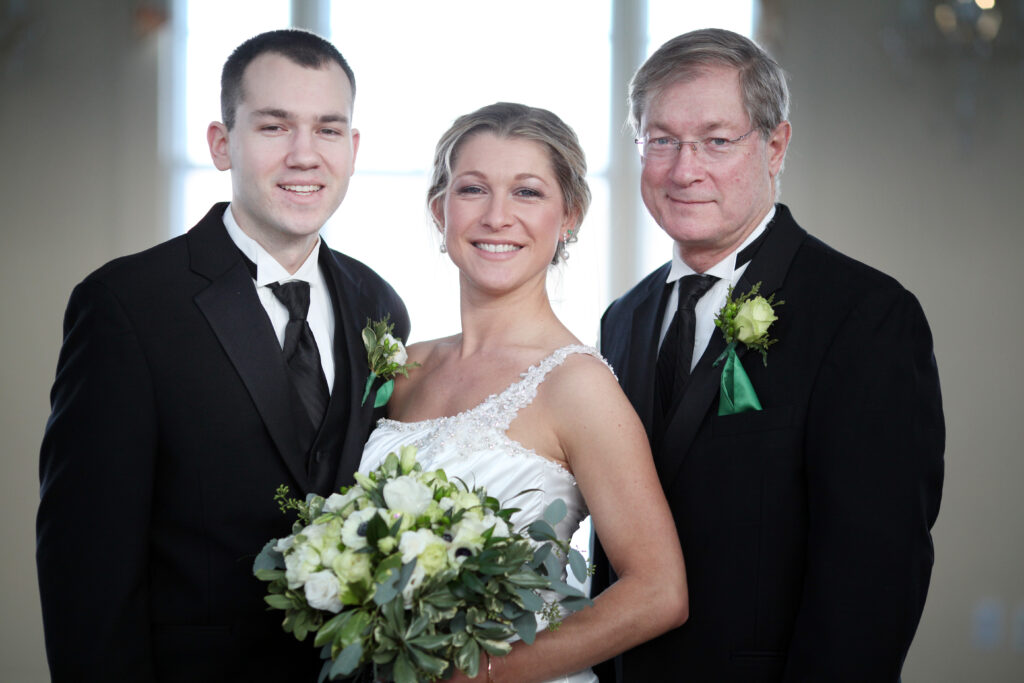
Pictured above from left to right: Steve's son, Nathan. Steve's daughter, Amanda, and Steve (on Amanda's wedding day).Wendy: Both you and Barbara ended up losing your jobs as a result of your brain tumors. In addition to economic insecurity, your number one concern was health insurance. I’m sure many, many Americans share the same fear especially during this time.
What advice can you offer to those who are facing the loss of employment and medical insurance?
Steve: You’ve hit upon a pet peeve of mine. Health-care. I do believe that the USA has the best medical technology and health-care professionals in the world. However, some of the holes in the health insurance system need to be exposed and patched. Barbara and I fell through one of those holes. We were both employed and our health insurance was employer-provided. It’s a good system as long as you don’t get too sick to work. Both Barbara and I were too sick to work for many months. We lost our jobs because of it. We lost our employer-provided health insurance along with our jobs. It seems ludicrous to me that when we needed health insurance the most, it was taken away from us. We had both worked all of our lives and had careers in good standing. Just when we needed insurance the most, the rug was pulled out from under us.
Wendy: A trend that I have noticed in doing these interviews is nearly every author has written about how underprepared they were for the emotional and physical toll of brain surgery. As survivors, we both know it would probably be impossible for neurosurgeons to anticipate with more detail what we as patients can expect from brain surgery due to the fact that there are too many variables and every brain is different. For example, in your case, you were told that you may have double vision for about three months. In my case, I recall being told I may have a permanent drop foot. I have to admit, I too was caught off guard by the severity of my predicament following my craniotomy. I didn’t end up with a drop foot but my entire right side was temporarily paralyzed and I couldn’t speak. One of my initial main concerns, like yours, was simply how fast I could return to work.
What suggestions do you have at this point for brain surgeons and/or patients who are about to embark on this journey?
Steve: Another great question. In your question, you stated one of the dilemmas of brain surgery. Every brain surgery is different. That fact makes it almost impossible to predict with certainty what the outcome will be. A doctor may be able to tell a patient what the full scope of post-surgical issues may be, but is that a good policy? I don’t know. Some patients may be adversely affected by hearing what the worst-case outcome could be. From a different perspective, I would have liked to have known what to prepare for. In my case, the surgeon told me that he had to go “aggressively’ after the tumor remnants that were attached to my brain stem. It was a decision he made after he had already invaded my gray matter. If he left them on my brain stem, the tumor would have certainly grown back. Yet by removing it all, it resulted in a very difficult recovery by the patient. Me.
Wendy: You wrote about the Bra-Bra Sisterhood. Who were they and in what ways did they help you and Barbara during your time of need?
Steve: How the group of women known as the Bra-Bra Sisterhood got their name is a funny tale that one can find in the book. In summary, they were a close-knit group of gal friends that all worked in the school system with Barbara. They were fun, humorous, talented and a loving group of ladies. Barbara was one of them. When I became sick, they were here to support us in any and every way. When Barbara became sick, they were with us every step of the way. They provided transportation, food, love, humor, friendship, and a shoulder to cry on. I can’t find the words to describe how valuable they were to us and our children in our times of need. True friends.
Wendy: You met your precious wife, Barbara on November 10, 1978. You married in May of 1979. You built a comfortable life in the nearly three decades that you were together. Some of your most touching scenes were around your descriptions of the love you and Barbara shared. For example, the night before your surgery, you wrote; “Our worries had been so trivial. Our material possessions no longer had value. The house, the cars—all were worthless, meaningless. Our love for each other mattered more than anything. I told Barb I loved her and thanked her for being a wonderful partner.”
If you had to do it all again what (if anything) would you do differently?
Steve: I can’t say that I would, or should have done anything differently. I tried everything I could think of for her to survive. I don’t think I made any mistakes in that effort. It helps me sleep at night knowing that I took the time to thank her and tell her how much I loved her. I would have forever regretted it if I hadn’t done so.
Wendy: You mused; “Up to this point, our family life had been good. Other than a broken arm or a blackened eye, we had all been healthy. But now, life was taking on a different dimension. One with an uncertain future, an unpredictable outcome—foreign to what we were used to. As a family, it affected us all. No one would escape. My physical health was in turmoil, and the emotional health of my family was at stake.”
How did you and your family adapt?
Steve: When I was diagnosed, our son and daughter were full-time college students. Because they were living away from home, communications with them were primarily by telephone or through social media. The physical separation was probably a good thing. If they had been living at home, they would have witnessed the day to day deterioration I was fighting against. Their schoolwork served as a distraction from what was happening at home. It was comparatively easy for them to continue on with their lives while their father was out of sight. When their mother was diagnosed, it was not new ground for them. They felt that since Dad had survived, of course, Mom would survive. It wasn’t until their mother died that they fully understood the gravity of brain cancer. At that point in time, we were all shell shocked. My daughter took refuge with relatives in another state. My son was so traumatized that he dropped out of school. I did my best to console them, but I myself was still recovering from brain cancer and the loss of my wife. Adapting was something that took months if not years. I know they still miss their Mom as much as I do.
Wendy: You also spoke so eloquently about taking the simple things in life for granted prior to your illness; “I was outdoors for the second time in weeks. What used to be routine in my life now felt like a gift. My view changed from the four walls of my room to a different landscape around each corner of the hospital. My outlook began to improve. I could swallow again if I tried hard. I could sit up, and I could move around. None of the things that I used to take for granted was easy, but the developments helped my depression subside. Hope rewarded with progress was the best medicine I had been given in weeks.”
“Hope rewarded with progress was the best medicine I had been given in weeks.”
Why do you think it takes a catastrophic event for so many of us to appreciate the simple things in life?
Steve: It may be cliché to say that your health is everything. Yet when I was dancing with the grim reaper, I’d have given away any of my material possessions to regain my health. I began to realize what truly made me happy. It was the simple things that we take for granted every day.
Wendy: Did you keep a journal? How did you recall with such great detail your journey and then Barbara’s?
Steve: I did keep a journal of sorts. It was in the form of emails I had sent to friends and colleagues. My wife had also sent updates on my status to her friends and colleagues. I was able to retrieve many of these emails to help me tell the story. The rest of the book came solely from memory. Many of the scenarios I wrote about were so traumatic for me that the details burned an indelible spot in my gray matter. And honestly, I was amazed at how many of the details I could recall once I started telling the story.
Wendy: You stated that you had been a skier longer than you could remember and you often included descriptions of nature in your passages. For instance; “Ice crystals glistened in the sun resembling flakes of diamonds on a bed of cotton. The beauty of the surroundings distracted the anxiety we were both feeling.”
Where is/was your favorite place to ski? Were you always mindful of the nature that surrounded you?
Steve: I’ve skied in Europe, South America, and all over the United States. In my early twenties, I was on the ski patrol at a resort in Colorado. I like to think that I was mindful of the nature that surrounded me. The ski areas in Switzerland, Chile and, around Lake Tahoe in California have spectacular scenery. Utah has the best snow and Colorado has great resorts. Of course, all of this is just a matter of opinion. It’s impossible for me to pick a favorite because they all offer the beauty of the outdoors.
Wendy: Naturally, you questioned; “How could this have happened? How could both husband and wife have brain tumors? What was the cause? Was our house toxic? Were we both exposed to a chemical agent? Were our children in danger? We had lived in the same place for decades. Maybe something was in the well water. I had it tested, and found nothing.”
Although there still isn’t a known cause for primary brain tumors, I’m curious if you ever discovered a likely reason why you and Barbara both ended up with this diagnosis?
Steve: I was never able to find a sure thing, but I have my suspicions of a potential cause, at least in Barbara’s case. She spent four years in the air force stationed at an airbase in New Hampshire. The base was closed many years ago. An extremely high percentage of former air force personnel, who worked on or near the flight line have since died of cancer. It’s been traced to a specific chemical that was used by the air force. That, of course, does not explain my brain cancer. The question of why a husband and wife both had brain tumors still vexes me. Were we exposed to something, or was it just very bad luck?
Wendy: It sounds like you became a very talented woodworker. You wrote the following passage to your woodworking friends; “When we were newlyweds, Barbara always encouraged me in my burgeoning hobby of woodworking. When our first child was born, Barbara asked me to make a cradle. My talent was lacking and the cradle showed it, but Barbara loved it because I made it. Today it sits in the back of the attic. Even though it is far from a showpiece, Barbara wouldn’t hear of getting rid of it. I honed my skills more with each piece I made and added a kitchen table and a set of chairs. Barbara always had another project lined up for me and everyone was an heirloom as far as she was concerned. I moved along from wood butcher to woodworker. She’d buy me tools for Christmas and birthdays. I tried to return the favor with jewelry boxes and kitchen cabinets. Almost thirty years later, most of the furniture in the house was made in my shop. Because of Barbara’s encouragement and support, those who know me now consider me to be an accomplished woodworker. Last week I made Barbara’s burial urn with the tools she provided and the skill she nurtured. Give your wife a big hug today, just because.”
Are you still woodworking? If so, what have you created?
Steve: Yes, woodworking is still one of my passions. I have built many desks, tables, and cabinets. I’ve also built a few wooden canoes. Wood has an innate beauty. Every piece of wood has a unique identity like a fingerprint.
Wendy: You spoke about how simple acts of kindness made all the difference in the world especially during the time when you and Barbara were at your weakest and most vulnerable. One memory you shared included a police officer who stopped traffic after witnessing you struggle to get Barbara into the car when you picked her up at the airport.
What positive message would you like to share with people about kindness?
Steve: We are seeing it today, the goodness in people. There are so many people opening their hearts to help others. The unlucky ones may have lost their jobs, money is tight and there are fellow human beings getting sick and dying. Even in this time of turmoil, it’s refreshing to find that people haven’t lost their sense of compassion for others less fortunate. We all have the capacity within us to make the world a better place.
“We all have the capacity within us to make the world a better place.”
Wendy: In the epilogue, you shared a few of the lessons you learned through this journey. For example, you wrote; “…the patient is not the only person who is affected by a lesion in their brain. Everyone around them is impacted and some may even need medical attention, albeit a different kind of treatment. Friends and family may suffer from painful emotional wounds. This is especially true for children. Another lesson I learned is that a seriously ill patient needs to be their own best advocate, or have someone close to them assume that role. The advocate has to be asking questions, taking notes, finding the best care, and demanding attention when they feel they may not be getting all they need. If Barbara had not been my advocate, I’m convinced that I wouldn’t be here to write this. If I hadn’t been hers, her life might have been one year shorter.”
Can you please speak about a few of the other lessons you learned?
Steve: My brain tumor and my wife’s death have changed my life in so many ways. I learned to take nothing for granted. What exists today may be gone tomorrow. Make the best possible use of every day as if it might be your last. Work on your bucket list now. Turn your dreams into reality. When you are at the lowest of lows, the only way out is up. Things will get better. Focus on the positives and pull yourself up.
Wendy: What else would you like the readers of this post to know?
Steve: If you have read everything up to this point, I hope you will also read If You Love Me Take Me Now. It’s a story that will give you a different perspective on life.
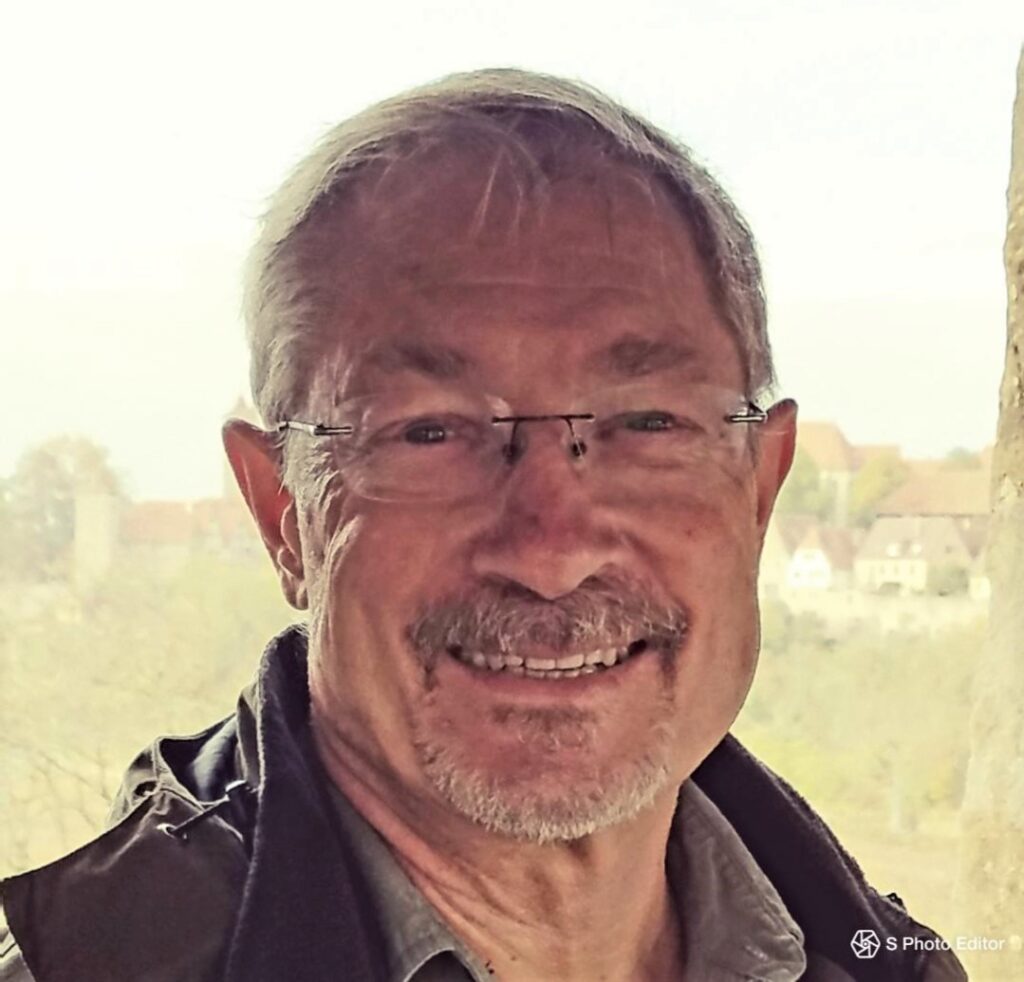
Also written by Steve Cox: No Shirt, No Shoes, No Service and Some Other Son

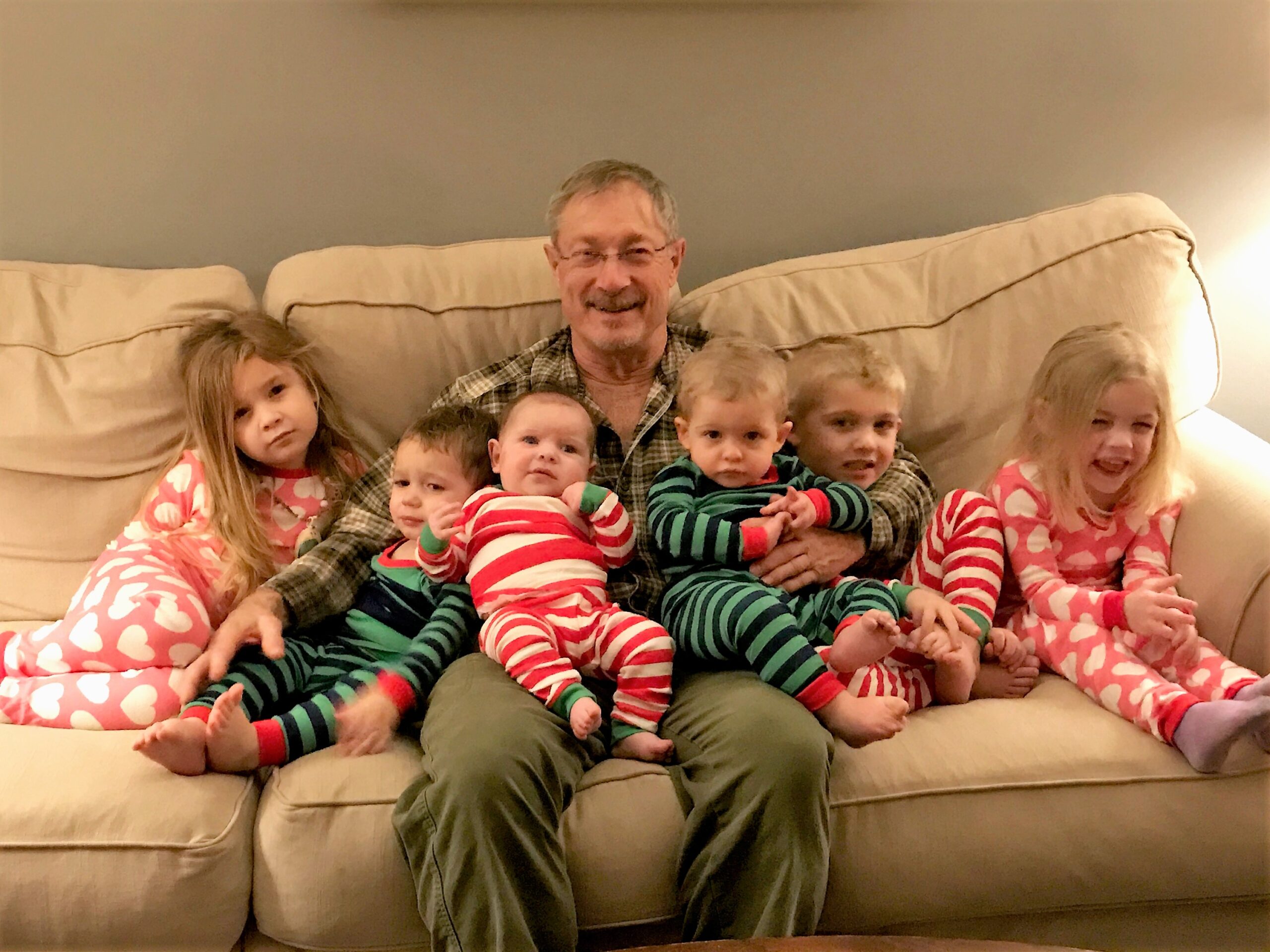
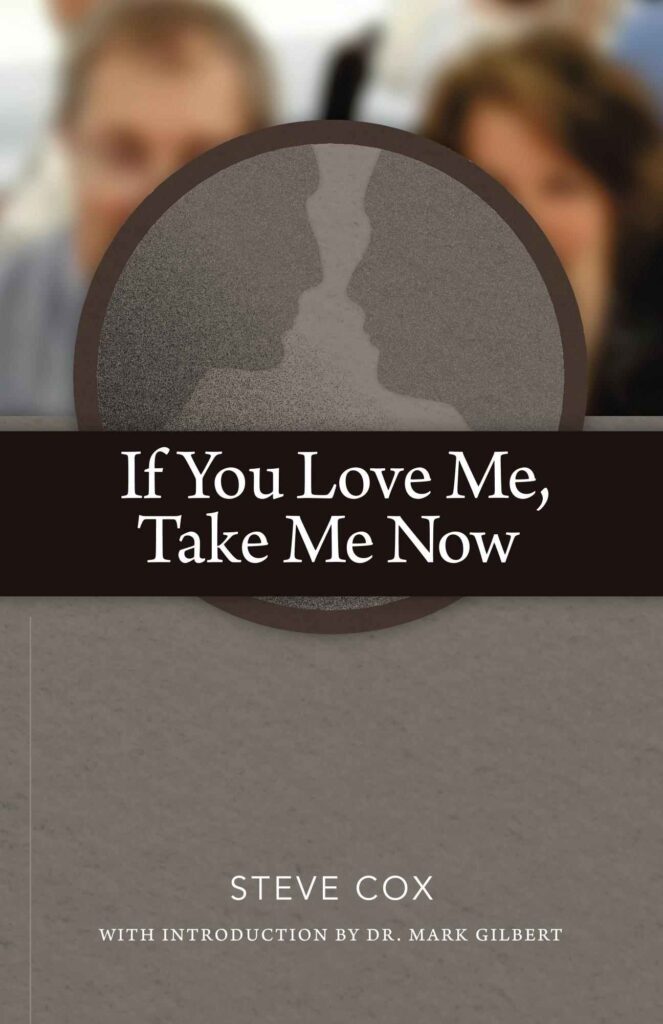
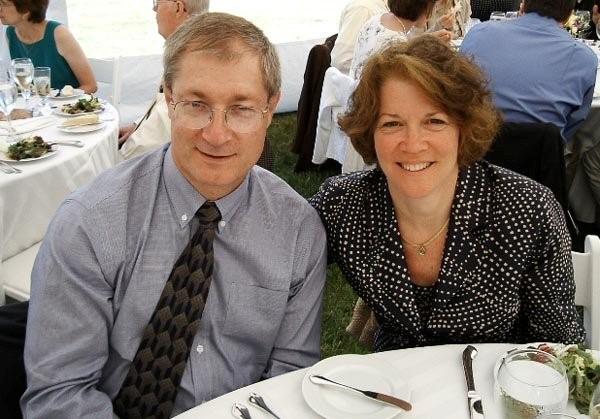
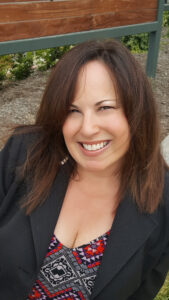 Hello. My name is Wendy and I’m a recovering workaholic. I'm also a brain tumor/cancer survivor.
The purpose of this blog is to share my experiences, memories, resources, and self-discoveries as I continue to transform from a workaholic into a more balanced person. I have read several books and stories about others who have had similar experiences
Hello. My name is Wendy and I’m a recovering workaholic. I'm also a brain tumor/cancer survivor.
The purpose of this blog is to share my experiences, memories, resources, and self-discoveries as I continue to transform from a workaholic into a more balanced person. I have read several books and stories about others who have had similar experiences 